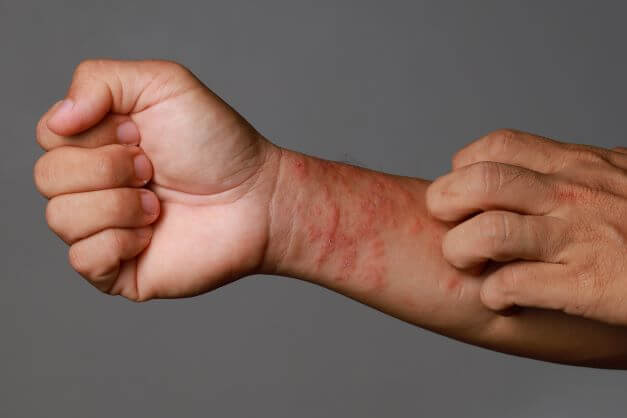Eczema is a chronic skin condition, and while flare-ups in this condition can happen at any time, the dry winter months can be the most challenging for people who struggle with eczema. According to Dr. Deepa Patel of U.S. Dermatology Partners in Rockville and Silver Spring, Maryland, “During the winter, people who have eczema are fighting an uphill battle to keep their skin hydrated and free from itchy, uncomfortable flare-ups. While it can be a challenge to keep eczema-prone skin healthy during the winter, there are a few simple steps you can take to prevent flare-ups and manage active eczema outbreaks to ensure skin heals quickly and comfortably.” In this blog, Dr. Patel breaks down some of the top recommendations for preventing eczema flare-ups during the winter and all year long.
What Is Eczema?
Eczema is an umbrella term used to describe several skin conditions. Dr. Patel says, “Eczema is actually a group of conditions that are referred to generally as dermatitis or eczema. The most common form of eczema is atopic dermatitis. This condition causes the dry, itchy, inflamed patches of skin that are characteristic of what most people think of as eczema. Contact dermatitis is another common eczema condition. The symptoms are similar, but they are focused on an area that has been exposed to environmental allergens or irritants. Whatever the specific type, all forms of eczema are skin conditions that cause inflammation related to an overreaction to certain elements in the environment. This occurs because the skin’s natural protective barrier is incomplete. Gaps or holes in this protective outer layer of skin make moisture retention more challenging, leading to dryness and irritation. It also allows dyes, chemicals, allergens, irritants, and other environmental materials to penetrate the skin’s deeper layers.” In addition to atopic and contact dermatitis, other forms of eczema include dyshidrotic eczema, nummular eczema, and stasis dermatitis.
Symptoms of Eczema Outbreaks
According to Dr. Patel, “Each type of eczema has its own unique set of symptoms, and it requires diagnosis by a dermatologist. The most common and consistent eczema symptoms are itching and dry, raised bumps on the skin. During a routine visit or a treatment appointment specifically for eczema, a dermatologist will carefully examine the affected area of skin to ensure the condition is eczema. They can also provide you with a specific diagnosis to ensure you receive the right treatments and develop the best skincare routine for your unique situation.”
In addition to the main eczema symptoms, some additional side effects of eczema include:
- Skin discoloration – may include spots or patches of red, brown, pink, light or otherwise differently shaded skin compared with natural skin tone.
- Burning – the skin may have a painful, hot feeling or a tingling sensation.
- Dryness – the skin may be dry, thickened, or have flaky patches.
- Hives – itchy, raised bumps or rashes that may appear swollen
- Inflammation – skin may look red or feel warm
- Sensitivity – sensitive skin may be more reactive to environmental allergens or irritants.
- Severe itch – itching that may become so intense or painful that it negatively impacts the ability to sleep or maintain daily activities.
Tips for Preventing Eczema Flare-ups
Atopic dermatitis, like many chronic skin conditions, is best managed through prevention. Dr. Patel says, “Preventing flare-ups before they ever begin is ideal, but it isn’t always possible. Making every effort to keep skin healthy can make a big difference in overall skin health, meaning eczema flare-ups that do occur are easier to manage. Your first step is to identify and avoid your individual eczema triggers. Each person has a unique set of factors that may trigger a flare-up in eczema, so I always guide my patients to carefully track any changes in their skin’s health and look for the specific factors that may have caused the flare-up. In most cases, I recommend using a journal or notebook and writing a basic note each day about general skin health, noticeable changes, and the environmental factors that may have caused the changes.” Some common eczema triggers that may need to be avoided to prevent eczema flare-ups include:
- Pet hair and dander
- Pollen, mold, plants, and fungus
- Dust and mites
- Dyes, chemicals, and preservatives often found in cleaning products (including laundry detergents), cosmetics, and skincare products
- Use of central air and heat
- Clothing that doesn’t breathe, is itchy, or holds moisture against the skin
- Certain foods
In addition to identifying and avoiding triggers, there are other simple steps you can take to prevent eczema flare-ups and reduce the number and severity of eczema outbreaks that do occur. Some of the common dermatologist-recommended preventive measures include:
- Change your skincare routine – remove any products that may be harsh, abrasive, or irritating to the skin. Simple is often better. Create an ultra-simplified skincare routine. Use a gentle facial cleanser, apply any skin treatments for areas of skin affected by eczema, and use a good facial moisturizer morning and evening. In the morning, finish up the routine with a broad-spectrum sunscreen. Additional products may be recommended by your dermatologist, but this very streamlined skincare routine can keep skin healthy.
- Adjust your shower routine – while it’s not pleasant, taking cooler showers can be beneficial to prevent you from stripping necessary moisture from your skin. Shower in lukewarm water and limit the time in the shower to keep skin hydrated. After showering, pat your skin dry with a towel. Then, apply a good, fragrance and dye-free full body moisturizer like the ALASTIN Skincare TransFORM Body Treatment with TriHex Technology.
- Skip the cosmetics – makeup can further irritate the skin that is already inflamed by an eczema flare-up. For this reason, it may be beneficial to forego your daily cosmetics routine. You can also switch to cosmetics that are skin friendly and hypoallergenic to limit reactivity.
- Wash before you wear – before wearing new clothes or using new towels and sheets, be sure to wash them. This ensures you’ll avoid introducing any environmental allergens or irritants to the skin.
Consult with a Dermatologist
If you want to start working with a dermatologist to address an eczema flare-up, prevent future eczema outbreaks, and keep skin healthy, U.S. Dermatology Partners would love to hear from you. With more than 90 dermatology office locations, the chances are good we’ll have a dermatology practice near your home or office. Getting started is quick and easy. Simply take a few minutes to complete our online request form. Once we receive your scheduling request, a team member will be in touch to finalize the details of your visit.
Find a location near me
or


